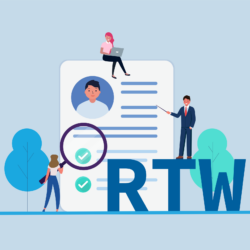Right to Work checks: IDSPs, IDVT and questions to ask

If you are exploring your options for efficient and compliant employee onboarding, read our handy guide which covers all the questions you need to ask before deciding.
Definitions:
Identity Service Provider (IDSP)
An IDSP is a provider of identity verification services. Some are certified to supply ID verification to specific government standards to support digital Right to Work checks, as well as Right to Rent and digital DBS checks.
Identity Document Validation Technology (IDVT)
IDVT can establish the authenticity of documents presented for identity verification purposes. There are different sorts, including physical scanning devices and web-based document validation services. IDVT providers may also be IDSPs who have been supporting identity verification for longer than the establishment of the Digital Schemes.
Right to Work checks
Digital Right to Work checks can only be made on eligible candidates, including UK and Irish citizens who have in-date biometric passports and anyone who has an eVisa and Share code. To check UK and Irish citizens, you must use an IDSP who can deliver checks in line with GPG45 Medium Level of Confidence.
For more definitions, download our Right to Work glossary
Why choose Identity Document Validation Technology?
An IDVT can:
- Save time
- Increase compliance
- Drive efficiencies
- Make checks from anywhere
- Protect your organization from fraudulent documents
What do I need to ask before choosing technology to support my Right to Work check process?
Here are 10 questions you can ask to help you find your perfect partner to help support your Right to Work checks.
1. Do you need an IDSP just for digital checks or an IDVT provider who can offer wider RtW support?
There are multiple ways employers can recruit employees. So, first you need to decide whether to introduce technology only for digital checks or whether you need technology for all checks.
If you’re making remote digital checks, you’ll need an IDSP for British and Irish in-date passport holders. For anyone with an eVisa, you can either use the Home Office service or work with a provider of IDVT. However, you may have candidates who aren’t eligible for digital checks, or you may choose to return to recruiting some, or all your candidates using face-to-face check. Technology can assist with face-to-face checks, including seeing the right combination of documents and the documents are genuine. However, you will need to work with an identity provider who can offer a wider IDVT services.
Whichever provider you choose from the Government list of IDSPs, find out whether they can check UK & Irish and eVisas (through Share code applications) and support manual document checks.

2. Is the service easy to use?
User experience is one of the benefits of technology, for both your internal team and your applicants. Any provider should offer a solution which is easy to use and understand, limiting the amount of technical jargon, whilst producing clear results. They should be able to tell you the percentage of successful validations and how quickly checks are returned. Check that the service can be used anywhere on a smartphone or tablet, if the phone is connected to the internet.
3. How is the service priced?
Ask the provider for a full breakdown of costs. If your volumes vary month to month, or the business is growing, it’s important to check if your contract can flex and change. You should be asking questions such as; what is the commercial model? Are there any additional costs? Is there a minimum order value? And are you charged for completed checks only?
4. How will technology make your onboarding more efficient?
Ask the provider for data around the time it takes to run an ID check. This will allow you to calculate a rough estimate of how much you’ll save by running checks through IDVT compared to making a manual document check.
5. What additional software does the service need?
A key consideration is whether your IT systems need to be updated or if there’s anything for your applicants to install. Some providers offer an online validation service which requires no app to install – the validation service uses an image of the identity document uploaded through a browser. Some services carry out validation by opening a chip held within an identity document, which requires an app.
6. What support does your provider offer?
Find out how the IDSP will support your business and applicants if they have any technical issues or questions or if a check isn’t successful. Does the provider offer a high level of support to users who run into problems? It’s important there are services such as phone, live chat and email available, as well as having staff members based in your country to ensure support hours align. Double check with any provider what their Service Level Agreement is, as this will provide a strong indication of support levels.
7. Is your IDSP certified?
It’s not essential to work with a certified IDSP, although certification provides assurance the IDSP meets relevant scheme guidance and the standards and Level of Confidence set out in the Trust framework. A full list of certified IDSPs can be found on the Government website.
8. If you need wider Right to Work support, how much can your provider offer?
Right to Work guidance is ever-changing. If your onboarding teams are spread across multiple sites, or you’re relying on local managers, a fully managed Right to Work service could help. However, it’s important you trust the IDVT provider to provide the best advice and stay on top of legislation. Confirm with your technology provider whether they offer a full Right to Work service, including confirmation of eligibility. If it’s needed, there should be a human on hand to help if you’re unsure on what to ask a candidate for.
9. How does the provider comply with data regulations such as GDPR?
Privacy and the safeguarding of confidential personal data should be a primary focus for all ID verification solutions. Any provider you use must carefully align its technology with legal data requirements. It’s crucial to understand how the IDSP handles your clients’ data generally and internally, as well as knowing how long the provider retains your and your clients’ data.
10. What are your integration options?
Most providers offer the option to integrate IDVT and Right to Work check services with other systems. These integration solutions allow you to quickly and easily set up an end-to-end onboarding journey and a smooth experience for all your staff and applicants. Alternatively, your provider should be able to share details of their API to allow you or your providers to build a bespoke integration. Double check the details of the different implementation options, including any associated costs. Are there any costs associated with the API? And if needed, what support can the IDSP offer if you build a bespoke integration?
To find out more information…
Sign up to receive updates
Receive notifications from TrustID direct to your inbox. Simply fill out your email address in the form below.
Want to find out more?
We’d be really happy to chat through your requirements and offer advice on the best service for your business.
Tel: 0118 466 0822 or email us.
Request a callback


